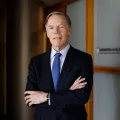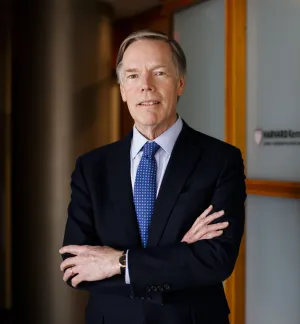George Washington University Elliott School of International Affairs
Ambassador Nicholas Burns
May 15, 2020
This certainly isn’t how you wanted to end your academic career at the Elliott School—with your Dean and me sending you off into the future through a taped, virtual, one-dimensional video ceremony.
Long ago, in the pre-coronavirus world of March 1, 2020, you probably imagined for your graduation a beautiful, warm D.C. afternoon, your class together one last time, your parents, siblings, significant others and friends in attendance as you experienced one of the great ceremonies in American life—your commencement, your launch into the future with a burst of collective energy, hope and optimism.
Graduations, however, can be bittersweet. Yours is uniquely so.
You may not have the classical memories each of your predecessor Elliott School graduation classes accepted as a right.
But, you will have a measure of solace they did not. There is no chance you will ever forget this unique moment. When the COVID-19 pandemic smashed into our world like a meteor in March and April, it changed our lives in ways we never thought possible.
That is one of the reasons I am truly honored to speak to you today about its meaning for you personally and for your class collectively.
I want first, however, to give special thanks to your dynamic leader, Reuben Brigety, for all he has done for your school as Dean and for our country as an American Ambassador. If we were all together, I would ask you to rise, give it up for Reuben and wish him well as Vice Chancellor at Sewanee, the University of the South.
What have you and we learned about our world, about each of the many nations represented in this beautiful, global kaleidoscope of a class during this tumultuous landmark year?
We’ve learned that yours is the first generation in global history where the fate of everyone—all 7.7 billion people in 195 nation states—is truly linked as never before.
That is what the coronavirus and extraordinary economic collapse have taught us this spring.
In January, we watched with deep sympathy as the people of Wuhan struggled heroically with the contagion.
In February, we lamented the cruel impact of the virus in Iran.
In March, the world cried over the avalanche of deaths in Italy and Spain.
And when the coronavirus hit hard in April in New York, New Jersey, Michigan, Louisiana, my home state of Massachusetts and many other parts of America, we saw heroes emerge—doctors and nurses, orderlies, custodial staff and first responders. They answered the call by pointing themselves into the storm on behalf of all of us.
As we meet this afternoon, the pandemic continues to race around the world—in Brazil and South Africa, Mexico and Indonesia, India and Mozambique. The cruelty of this virus is that it hits the poor hardest here in the U.S. and in every country of the world.
We’ve also learned how some governments rose to the challenge by making rapid decisions to lock down their populations while being guided by data and public health experts.
South Korea, Singapore, Taiwan, New Zealand, Australia, Israel, Germany, Austria and Denmark are in this group. Nearly all are democracies and a number, by the way, are led by women.
We’ve learned that authoritarian governments—in China, Russia and North Korea—refuse to provide accurate information to their own citizens, much less the rest of the world, or admit that they might have erred in any way.
In Europe, walls were raised between countries for the first time in generations as the nation state re-emerged and the European Union seemed, for a time, a mere bystander.
And here in the United States we learned a bitter lesson—how unprepared we were for the speed and ferocity of the virus. How the federal government must be better the next time a pandemic hits—more competent, more organized, more consistent in its leadership of the states, more honest in its assessments.
We’ve learned that we need a stronger social safety net for the poor and middle class in America, that health care is a right for every person and that we need leaders who put science and the country first.
When global collaboration was needed to combat the pandemic and to stem the recession, however, we saw the two strongest global powers—China and the U.S.— fight a war of words instead over who was most responsible for the virus itself.
We saw a nearly inert G-20, G-7 and United Nations Security Council.
There was simply too little international coordination, collaboration, cooperation and too little selfless and effective global leadership.
If we choose not to work together to combat the coronavirus, how in the world will we in future years combat climate change, global human trafficking organizations, crime and narcotics cartels and all the other threats we face?
That is some of what we have learned during these first five months of 2020.
This brings the conversation back to you—your amazing global and multinational, multi-ethnic and multi-religious Elliott School class.
You are about to go out onto the front lines of the world to try to make governments work better, to help societies heal and to recover from the shock of what we have experienced.
You have one challenge: lead us forward.
Rebuild, renew and restore the world. Give us hope for the future.
His Holiness Pope Francis spoke at the height of the disaster in Italy in late March to this fundamental challenge. How do we unite a divided world in an age of pandemic? Here is what he said:
“We have realized that we are on the same boat, all of us fragile and disoriented, but at the same time important and needed, all of us called to row together, each of us in need of comforting the other.”
Pope Francis was right in his crucial insight. We’re all on the same boat now in ways both literal and metaphorical.
We’re in the same boat on climate change.
On the economic crisis that has affected every village, city and country in the world.
On the fight against cyber hackers and terrorists.
On the fight against income inequality, racial injustice and human rights violations.
The coronavirus has changed the world forever. The defining lesson for the decades ahead is this: countries that go it alone, build walls to keep their neighbors out, and succumb to narrow nationalism cannot possibly succeed for their citizens in the networked world of your future
We Americans have a special responsibility, given our power in the world, to be responsible in its use. Great nations do not pull away from global leadership. Instead, we need to recall what made us truly great in the seven decades since World War Two—our openness to immigrants and refugees, the faith we had in our allies who stood by us on 9/11 and in countless other moments, our support for free trade, our defense of democracy and human freedom.
Your generation will struggle, as did ours, with the inevitable competition among nations for power, influence, resources and position. While you are right to try, you likely won’t succeed in banishing all conflicts, stopping all wars and eliminating injustice from human history.
But, you can, at the very least, convince China and the United States, India and Pakistan, Israel and Iran, conservatives and liberals, communists and democrats to acknowledge one essential point about the world going forward—our common humanity.
On the big existential issues that pose a threat to us, we are all on the same boat now. We must thus pull on the same oar.
Your generation will confront many tests in the future. Here are two that are immediate and vital:
First, find a way across national, religious and ideological dividing lines to defend against these extraordinary threats to the future of our life on earth together.
Second, advance the positive, hopeful global trends that can make life better for all.
Advance the historic alleviation of poverty in recent decades and, in the next decade or two the eradication of polio, river blindness, malaria and other diseases. Advance women’s rights. Advance the power of technology to create a carbon free world by 2050.
The only way you can change the world for the better is to go into the arena of public service in America and around the world.
I know it may be tempting to earn your first trillion on Wall Street. But we need GW students out on the front lines of the public battles to make your future more stable, just and peaceful than our present.
Theodore Roosevelt said it best. In a historic May 1910 speech at the Sorbonne in Paris, he said memorably about public service: “The credit belongs to the man [or woman] who is actually in the arena, whose face is marred by dust and sweat and blood;….who does strive to do the deeds…who spends himself in a worthy cause”…“Who if he fails, at least fails while daring greatly, so that his place shall never be with those cold and timid souls who neither know victory nor defeat.”
May you leave GW today determined to make a difference in the arena of public life for the public good.
Be true to those who taught you the most important life lessons—your mothers and fathers, brothers and sisters, aunts and uncles and grandparents who are cheering you on today.
I have one more request. Please give us hope!
Let me leave you, in that spirit, with the memorable words of the late, great Irish poet, Seamus Heaney:
“History says, Don’t Hope
on this side of the Grave.
But, then once in a Lifetime
The longed-for Tidal Wave
of Justice can Rise Up,
and Hope and History Rhyme.”
Congratulations!
Burns, Nicholas. “GWU Commencement Address Delivered on May 15, 2020.” May 15, 2020


